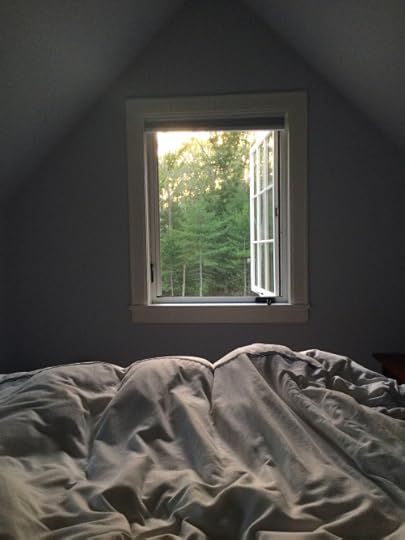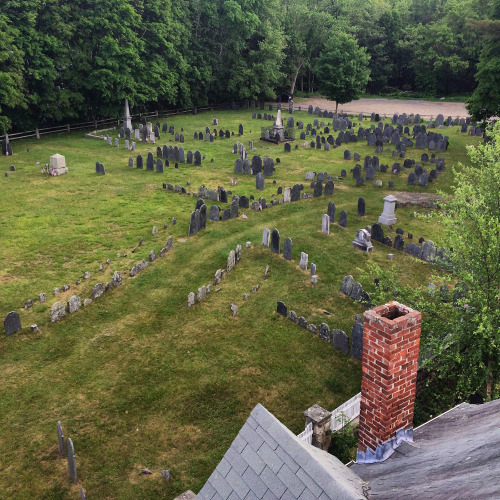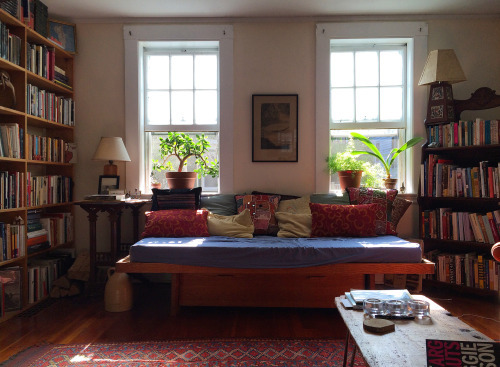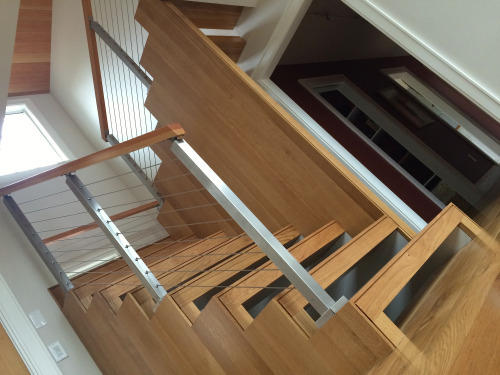Nina MacLaughlin's Blog, page 14
June 28, 2016
South of here fifty miles, on the banks of the Slocum River,
on...

South of here fifty miles, on the banks of the Slocum River,
on a weeknight last week, a baby owl yelled from the onset of darkness –
about nine o’clock on these solstice-close nights – until three a.m. at least.
A terrible screeching cry, nothing like the haunty whooo-whooo of older owls.
It sounded like something in pain, something scared or mad or in bad need of
help, and I wondered, trying to sleep, when its voice would tire out. If you’d
asked, I would’ve said it yelled every forty seconds. The next night I timed it,
lying in bed not sleeping, window wide and letting in cool, coastal air. Not
every forty seconds. Every nine or ten. Every nine or ten seconds for almost
all the hours of the night. Why are you yelling, I said into the quiet room. I
fell asleep at some point. I was away from home helping my dad with projects,
making and hanging shelves, building a trellis system for beans he’s growing in
his new garden, helping him organize his workshop. Time changes outside the
city, expands and contracts in different ways. I didn’t have a skillsaw with me
and used a regular old handsaw to cut across some plywood. The powersaw
would’ve taken about four seconds to run across twenty-two inches of
plywood with its own scream traveling across daytime backyards. The first piece I cut
with the handsaw, I guessed it took me over twenty minutes. I was wrong. I
timed the second one and it took nine minutes, with time to rest my shoulder
now and then. Three days by the river felt like ten, in a good way. It’s summer
now and time’s trudge in the city seems like something worth avoiding.
June 21, 2016
Backyard poem
The flock came first. We stood outside on an afternoon before
the day started dimming, this in November some years ago in a backyard
horseshoed by forest. At flicker between the trees moved a winged cloud, a
static of black between the branches, and I thought: geese. Wrong. They moved
from the South into the scoured sky above us. Crows. Twenty, thirty, more than I’d
ever seen together at once. And their calls sounded off, not the rich deep caw,
the charcoal-throated monosyllable from the powerline, but pinched, choked,
higher-pitched. A dooming frantic racket. Local nightly newscasts had alerted us
to black bear sightings in the neighborhood. The backyard pool was emptied,
closed since September, its blue shroud taut as a trampoline. Leaves skimmed
across it as though it was ice. Summer was done. The mosquitoes wouldn’t wake
that evening, and the fireflies, which began their starry throb by the bushes
at the edge of the yard in the evenings in August, who knows where they were?
Dead, too, or resting in some nest all against each other, either way
unlighting.
Then from the forest, from a place we couldn’t see, another cry, a
flat and nasal bleat. “What the fuck?” said someone’s father. “Was that a
bird?” No bird. Hindinger’s Farm, a mile up the hill, in summers sells
strawberries, honey, tomatoes, corn. Fifty cents buys a paper bag of stale
wafers to feed to the four goats penned to the left of the farmstand shed. Next
time, look into the eyes of the goats: their pupils are rectangle. Had one
escaped? Rogue goat in the woods? Were Pan’s pupils round or right-angled?
Another bleat from nearby, unseen. “What is it?” Best guesses boiled down to
helplessness. What was out there? We didn’t know. We wouldn’t know. Make yourself at home with question marks,
I’ve been told. I’ll tell you, though: it’s no sort of shelter. We went inside
with our arms loaded with firewood, left dusk to overtake the woods.
June 10, 2016
The woman was nervous. She prowled around the perimeter of
the...

The woman was nervous. She prowled around the perimeter of
the sunroom pointing upwards to where wood met glass. Not this past winter but
the one before, the burying one, the one when Boston was near-weekly avalanched,
ice dams formed on the glass roof of this couple’s sun room and “water was
pouring down the walls,” she said, “pouring, pouring!” It was traumatizing,
must’ve been, to hear something strange from the living room – what’s that noise – to
step into the doorway from the kitchen and see water pouring down the walls.
The indoor-outdoor split is so definitive, particularly here in this handsome
brick home in a town northwest of the city, that to find, suddenly, rivers,
lakes, waterfalls inside your very home, it’d be as psychically jarring, as surreal
and nightmarey as walking into a room and finding, there against the wall, a
big, brown-eyed elk, nostrils flaring with every breath.
She thought a lot was wrong. She talked of ants and rot. On
the outside, up on ladders, we pried off pieces of wood to get a look inside and
scout for wet. Dry as a bone, and what a relief! “The water came in, the water
went out. This is good news,” we told her. She was not convinced. “But look
there, and that corner, and see where the paint is peeling?” We took off more
wood. Dry, dry, dry. “It’s in better shape than we thought it would be,” said M.
The woman narrowed her eyes and shook her head, skeptical. “And what about that
section below the gutter?” she said. Fine as well. She seemed almost pained, wanting
to make us see what she sensed, like a patient trying to convince a doctor of
symptoms that speak to something gravely wrong, like the doctor sending the
patient home with a suggestion of water and rest. In her eyes, the cock of her
head, you could see her thinking, I know
better.
She called in the architect who’d designed the room. He
peered around, stuck his fingers places. “Looking good,” he confirmed. “There,
though?” she said. “You’re lucky,” he said. I stood high on the ladder and
listened between pounding on the cat’s paw to remove another nail to peel back
another layer. “I’m just really afraid that –” She didn’t finish the
sentence.
Later, by the van, the architect, bumming a smoke from M.,
said to us, quietly, “They don’t have kids. The sunroom is their baby.” And
with that, somehow, all the air was sucked out of the afternoon.
June 7, 2016
The clouds swelled high, thick, and threatening. Nothing
wispy,...

The clouds swelled high, thick, and threatening. Nothing
wispy, these clouds were more like mountains. We worked quickly to beat the
thunderstorms forecast for the afternoon, installing railings high up on a roof
in Lexington which overlooks an old graveyard. The sun crushed us and below, a
cluster of young kid fieldtrippers wandered around the graves which emerge from
the earth like crooked mossy teeth. I asked the owner if he’d ever slept up on
his roof. He said he hadn’t, but that I was welcome to whenever I felt like it.
I like the idea of spying on the ghosts at night, to see what sort of flirting
they do. (At-night graveyards are ghost flirt-fests, I have a feeling.) I like
the idea of seeing them in the moonlight, perched on their weather-worn stones.
Did the kids on their fieldtrip think about ghosts? I bet maybe they don’t so
much think about them as feel them, here and there, in between thoughts about
lemonade and swimming and chasing each other unaware of the clouds which continued to rise
and rise and swell.
May 18, 2016
I have been at home. It started in the latter half of
February....

I have been at home. It started in the latter half of
February. We’d finished a big job, and I’d asked M. if I could take some time,
three weeks or four, to revise a draft of a new book project. It was good timing;
she needed a break as well. But then it went longer, and a little longer after
that. And I wrote and wrote and got weird spending days alone in my brain.
Carpentry work rolled around
again, a bathroom job that started with stalls and stutter steps, thrown off by
a plumber in crisis which meant more days off from building.
And now again, stalls and delays for various reasons, so I continue
writing. I woke up one morning earlier this week and looked in the mirror as I
tied back my hair and saw that all my muscles were gone. They’d lasted months
without lifting saws and pressing on the drill and hammering and lugging
lumber. Then, one morning, all at once, gone. My body, suddenly feels
unfamiliar. And what I’m thinking about is building decks, hoping we win a bid
for one, and getting strong again. The view, above, of my living room, of the
inside of my own skull, is getting too familiar and different muscles now need
flexing.
May 17, 2016
Beginning, middle, end. A room gets gashed. Walls are sawed and...



Beginning, middle, end.
A room gets gashed. Walls are sawed and boards of floors cranked up with a crowbar. A tub is yanked and tugged, like negotiating with a stubborn cow, and lugged down two flights of stairs from the third floor out to a garage where it looks all wrong, like putting that cow in a shopping mall, or a chandelier in a bathroom.
And then, middle, middle, middle, when all the work gets done.
After the holes have been patched, the floor leveled, the cement board tiled, the pipes plumbed, the ceiling painted, the grout dried, the tiles buffed, after the floor is swept and swept again, then vacuumed, then sponged, comes a moment when everything gleams with a newness that reminds all involved of the possibility of healed wounds and fresh starts, of coming out okay on the other side of change. That injection of optimism, the feeling of possibility, is, I think, what fuels the long and dusty middles.
May 6, 2016
Hammering
Journey of the life
plan, no plan, test plan, new plan
“always measure twice”
Daily Haiku, May 3, 2016
Inspired by seeing Nina MacLaughlin (Carpentrix) read from her great book, Hammer Head, which I highly recommend.
A Hammer Head haiku! By the lovely Jeffery Yamaguchi. I am flattered to the max.
May 3, 2016
One final reminder, friends. Tonight at 7 pm I’ll be at...

One final reminder, friends. Tonight at 7 pm I’ll be at Community Bookstore in Park Slope in conversation with Heidi Julavits and @rachelfershleiser. Please do come.
May 2, 2016
rachelfershleiser:
Two women whose work focuses on the small...


Two women whose work focuses on the small details of making a career and a good life in conversation about time, work, diary-keeping, and the meditative nature of memoir-writing. With references to Ovid, Annie Dillard, Studs Terkel, and Mary Oliver, Nina MacLaughlin’s Hammer Head takes us on a journey from job to job–building a wall, remodeling a kitchen, gut-renovating a house–while illuminating the deep sense of meaning to be found in manual labor. In The Folded Clock, Heidi Julavits explodes the diary-form into a moving meditation on time and self, youth and aging, friendship and romance, faith and fate, and art and ambition. Nina and Heidi will be joined in conversation by Rachel Fershleiser.
(via 5/3, 7pm Nina MacLaughlin & Heidi Julavits, with Rachel Fershleiser | Community Bookstore)
Please join us! I’m so excited to interview these geniuses!
TOMORROW! New York pals, come join Heidi Julavits, Rachel Fershleiser, and me at Community Bookstore Tuesday evening at 7 pm. I really think this is going to be good. Come, come, come.
In the old houses, stairs creak. Wood swells and shrinks over...

In the old houses, stairs creak. Wood swells and shrinks over years, changes shape, and the pieces whine and wail under weight as a person presses up or lands down. I like the way time gives voice to houses. The exception was during summers when I was young and trying to sneak out of the house at night. I learned to put my weight on the edges of the steps, where tread met wall, a wide-legged stance, bracing myself on banisters, to make a quieter passage. I was at a new house recently, less than a year old, and built by the top-tierest builders. The steps, above, float. And in stepping on them, up or down, not only are they silent, it almost feels as they rise just so to meet your foot, pressing up against you as you press down. Mute now, pre-verbal, how long will it take them to learn to talk?



